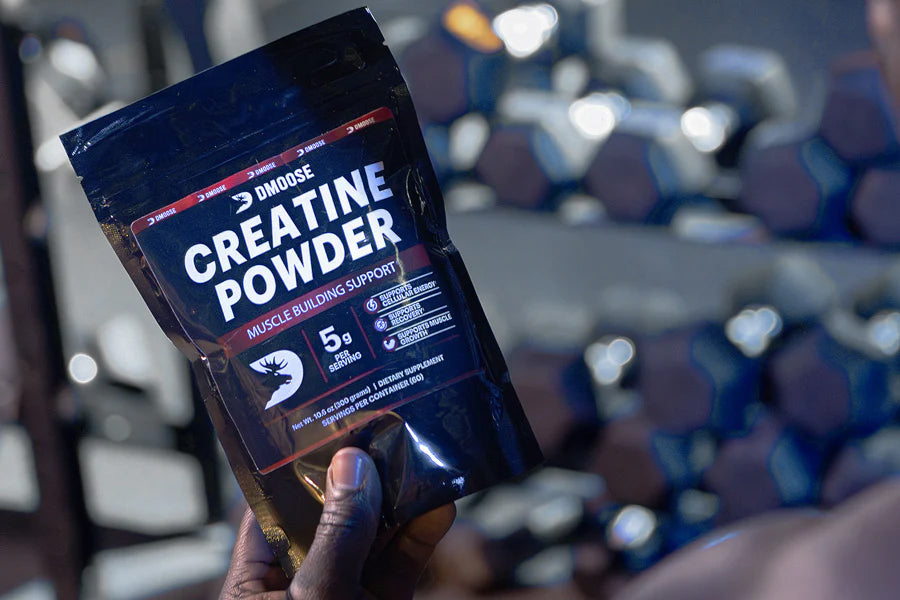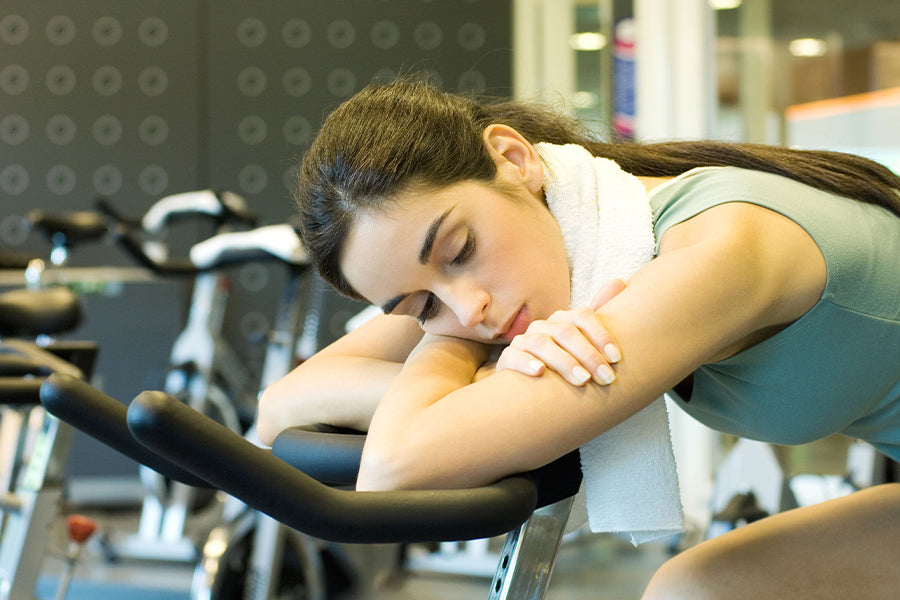We've all been there – hitting the gym or the trail and suddenly thinking, "Why does my body feel heavy?" or feeling drained within minutes of starting the workout. It's like running with bricks in our shoes, right?
You're definitely not the only one scratching your head over this. In this guide, we're diving deep into the relatable woes of workout sluggishness.
From nutrition to sleep and hydration to stress management, we'll cover all the essential factors that impact body energy levels and help you get the most out of your workout routine. So let's dive in and uncover the secrets to feeling energized, focused, and motivated during your workouts.
10 Reasons Why Do I Feel Weak When Working Out?

From health problems and hormonal changes to deficiency of specific nutrients in the body, various reasons could contribute to the constant exhaustion you experience while working out.
While many people ignore daytime fatigue, considering it normal, medical issues, treatment, habits, and emotions may be why you feel fatigued. Besides, your fatigue may even be considered to be a chronic condition.
This section refers to the most common causes of fatigue to help you identify the exact reason behind your tiredness.
1. Not Having Enough Sleep

If you find it hard to muster energy for workouts, check if you are sleepy after workout and monitor your recent sleep patterns. Not sleeping enough can increase fatigue, especially since exercise stresses the body.
Daily stressors, like work or relationships, can make workouts tougher if you're not resting well. Research shows poor sleep hampers athletic performance, while adequate rest enhances it.
So, how to avoid feeling sleepy after a workout? Well, keep a journal of your daily feelings, sleep hours, and other life routines. Regularly skimping on sleep stresses the body, making exercises even harder.
Related Article: How to Optimize Your Exercise for Better Sleep, According to Fitness Experts
2. Diet Issues

If you do not have enough energy to work out and are generally tired of working out, there is a high chance that your muscles are not receiving the nutrients that they need. Your muscles heavily rely on carbohydrates, like cereals, bread, fruits, and vegetables, that help you gain quick energy bursts.
“It is highly recommended that you eat a combination of protein and carbohydrates before working out to build muscles and sustain energy.”
Kate Patton, RD, Sports Nutrition at Cleveland Clinic, Ohio.
Research suggests mixing carbohydrates with protein can maintain blood glucose levels during anaerobic exercise. This combination also speeds up recovery from oxidative stress.
You can add Whey Protein Isolate to your diet. It has 90%+ pure proteins, BCAAs, and leucine, easily digested and absorbed by the body.
Related Article: How to Start Eating Healthy and Stick to It: 8 Changes You Can Make
3. Hormonal Changes

Hormonal changes, influenced by factors such as pregnancy, menopause, and thyroid disorders, can affect workout performance by causing fatigue and reduced stamina.
When released under stress, the "stress hormone" cortisol can lead to muscle breakdown and increased fat storage, reducing energy and workout efficiency. A decline in estrogen levels can result in muscle weakness, diminished stamina, and bloating, further hampering exercise motivation and performance.
Recognizing and managing these hormonal imbalances is crucial for maintaining optimal workout performance. Try adding Immune Support Supplements for improved gut condition, as it has 60 billion CFU probiotics. They not only improve digestion but also keep the hormone and immune system balanced.
4. Thyroid Issues

Thyroid problems can significantly affect your energy levels during exercise. The thyroid regulates metabolism, and issues like hypothyroidism can cause fatigue, weight gain, depression, and muscle pain, making workouts more challenging.
The American Thyroid Association states that while one in eight women have thyroid issues, 60% are unaware that their thyroid might be causing their health problems.
If unexplained fatigue persists, it's essential to consult a doctor, check thyroid levels, and seek appropriate treatment to enhance energy during workouts.
5. Iron Deficiency
Iron deficiency is another reason for feeling shaky after workout. When you have insufficient iron, your body can't produce enough hemoglobin, leading to anemia. Anemia causes fatigue, weakness, and shortness of breath, making it challenging to perform moderate exercise.
It’s more common in women than men, and athletes engaged in endurance sports may also be at higher risk due to increased iron loss through sweat.
Find the perfect multivitamins for all your mineral deficiencies. It helps meet your daily mineral and vitamin requirements besides giving a lot of benefits, such as improved strength, good mood and energy, and better immunity.
6. Dehydration During Exercise

Feeling drained during workouts? Dehydration could be the reason. Dehydration during exercise can also lead to dizziness, cramps, and fainting. Hydrating before, during, and after exercise is vital.
Experts suggest drinking 16-20 ounces of water or a sports drink 4 hours before and 7-10 ounces every 10-20 minutes during workouts.
If you regularly perform strength-building exercises, you can ensure adequate hydration levels by taking Electrolyte Capsules consisting of Vitamin D, Calcium, Phosphorus, Magnesium, Chloride, Sodium, Potassium, Boron, and BioPerine for hydration and increase your strength and endurance during workouts.
Also keep a water bottle with you when working out to keep your body hydrated.
7. You Need to Carb It Up

Carbohydrates are the body's primary energy source, essential for peak performance during exercise. Insufficient carb intake can result in feeling tired due to low glycogen stores.
Consuming healthy carbs like sweet potatoes, quinoa, and brown rice is crucial before workouts. The amount and timing of carb intake vary based on activity level, body size, and goals.
Eating them too closely to exercise can cause digestive issues, while inadequate pre-workout carbs can lead to energy depletion.
8. You Are Not Recovering

Overtraining without adequate rest can lead to mental and physical fatigue. Persistent muscle fatigue is a warning sign of excessive stress. Exercise-induced oxidative stress increases the risk of injury and, as noted in Sports Health, can lead to depression.
If you lack energy for workouts, you likely haven't allowed sufficient recovery. Taking at least two rest days weekly can improve performance and rejuvenation.
Related Article: How to Speed Up Muscle Recovery 10x Faster
9. Underlying Medical Conditions

While it's common to feel tired after exercise, persistent and disproportionate fatigue can indicate health issues that might be affecting your body's ability to recover or produce energy efficiently.
Conditions like heart disease, diabetes, anemia, or thyroid disorders can cause heightened feelings of exhaustion post-workout.
If you consistently feel overly fatigued after exercise and can't attribute it to other factors like poor sleep or nutrition, it's essential to consult a healthcare professional to rule out potential underlying health concerns.
10. Anxiety

Anxiety can be a significant factor contributing to feeling sluggish during workouts. Anxiety and stress can elevate hormone cortisol levels, which can cause fatigue and low energy levels.
Additionally, anxiety can increase muscle tension, making it harder to perform exercises properly and efficiently. It can also make it difficult to focus on the workout and decrease motivation to exercise.
If anxiety affects your workout performance, consider incorporating relaxation techniques, such as deep breathing or meditation, into your routine to help manage stress levels and improve your mental well-being.
How to Avoid Feeling Sleepy After Workout?

Now that you know the various reasons that could cause extreme fatigue after a workout and have identified your reason for feeling weak during a workout, you must know what could help you restore your lost energy levels.
Some of the steps that can get your energy levels back and help you sustain them are discussed below:
1. Take Right Supplements

Workout supplements play a crucial role in efficient results. They can help increase your energy levels and decrease fatigue while helping you push harder, especially during prolonged training hours.
The amazing DMoose Creatine Monohydrate Powder is specifically designed to help refuel your body after you have been through a strenuous workout. It has creatine monohydrate in its purest form to aid in fast recovery and overcoming exhaustion.
2. Focus on Your Diet

Diet is one factor that affects all aspects of your life, be it your physical performance or mental health. It would not be wrong to say that you are what you eat; therefore, you must focus on your diet plan to ensure your diet is getting all essential nutrients to your body.
A balanced diet consisting of all nutrients, such as carbohydrates, protein, vitamins, and the required fats, is what you must aim for to improve your energy levels and give your best during a workout.
3. Ensure a Proper Night’s Sleep

Having a good night's sleep is crucial if you want to perform in the gym the next day. A good night's sleep will prepare your body and help you power through a high-intensity workout without experiencing fatigue and sluggishness.
Key Takeaway
Experiencing constant exhaustion and sluggishness post-workout isn't typical. Factors like diet, sleep, hormones, and medications can contribute to feeling drained.
For better workout performance, prioritize a balanced diet, proper sleep, and ensure adequate nutrient intake. Taking the right workout supplements, such as Creatine Monohydrate, Immune Pro Support, and Electrolyte Capsules, can also boost endurance and overall performance.
Try them out today and start seeing the results you desire!
Reading List
Article Sources
- Ferreira, Daniel dos Santos, et al. Carbohydrates plus Protein Reduces Oxidative Stress after Single Bout of Aerobic Exercise. 2017. ua.es, https://doi.org/10.14198/jhse.2017.124.07.
- Kreher, Jeffrey B., and Jennifer B. Schwartz. “Overtraining Syndrome.” Sports Health, vol. 4, no. 2, Mar. 2012, pp. 128–38. PubMed Central, https://doi.org/10.1177/1941738111434406.
- Oliver, Samuel J., et al. “One Night of Sleep Deprivation Decreases Treadmill Endurance Performance.” European Journal of Applied Physiology, vol. 107, no. 2, Sept. 2009, pp. 155–61. Springer Link, https://doi.org/10.1007/s00421-009-1103-9.
- Thun, Eirunn, et al. “Sleep, Circadian Rhythms, and Athletic Performance.” Sleep Medicine Reviews, vol. 23, Oct. 2015, pp. 1–9. PubMed, https://doi.org/10.1016/j.smrv.2014.11.003.



















